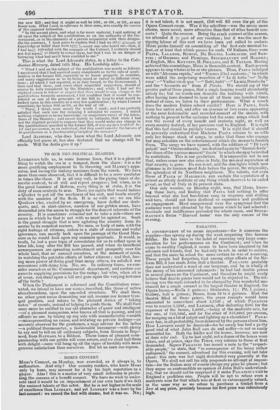TO OUR NON-POLITICAL READERS.
LUCRETIUS tells us, in some famous lines, that it is a pleasant thing to watch the sea in a tempest, from the shore : it is a far more gratifying employment to be throwing out 1\1Am:iv's appa- ratus, and saving the sinking mariners from the wreck. We have more than once observed, that it is difficult to be a mere spectator in times like these. It is all very well, in the piping times of do- mestic content, to sit still and report progress ; but when, as in the great business of Reform, every thing is at stake, it is the duty of even neutrals to arm. There are sights that would induce a Quaker to put off the meekness of his sect, and bustle stoutly with the muscles of the flesh. It is so with us : we are like Quakers who, excited by an emergency, have doffed oar drab- coats, and, in shirt-sleeves, careless of our golden mean, have descended into the arena to struggle for the dearest interests of the country. It is sometimes criminal not to take a side—there are cases in which he that is not with us must be against us. Such is the grand struggle that is now agitating the country from its centre to its remotest corners. No man, or body of men, with the right feelings of citizens, unless in a state of extreme and woful ignorance, can merely look upon the passage of the Great Mea- sure as he would look upon any common spectacle. It would, in truth, be but a poor topic of consolation for us to reflect upon in later life, long after the Bill has passed, and when its beneficial consequences are spreading contentment and prospeiity over the whole land, that we amused ourselves, at the moment of crisis, in watching the patriotic efforts of better citizens ; and that, hav- ing more power of doing good than many others, we satisfied our conscience with doing less. No, no. In ordinary times, we con- sider ourselves of the Commissariat department, and confine our cares to supplying provisions for the camp ; but who, when all is at issue, can stand upon a hill and gaze upon the varying fortunes of the battle ?
When the Parliament is reformed and the Constitution reno- vated, we intend to have our names inscribed, like those of active churchwardens, upon the amended structure. We shall then, no other great cause demandine.'' our aid, resume our former tran- quil position, and return to the pleasant duties of " taking notes" of events, instead of helping to guide them. We shall then once more be entitled to our old character of quiet and intelligent .—of a pleasant companion, who knows all that is passing, and yet offends no one by taking up any side with uncomfortable- warmth —misrepresenting no cause, and irritating no private feelings—an accurate observer for the gentlemen, a sage adviser for the ladies —a political thermometer, a fashionable barometer—with plenty to say and to tell on all sublunary subjects, from Russia to Rape- seed, from RAPHAEL to a Ribbon. Those times of pleasant com- panionship with our public will soon return, and we shall hail them with delight—none will hang up all the signs of hostility with more genuine satisfaction than ourselves. But let us earn our repose.


























 Previous page
Previous page